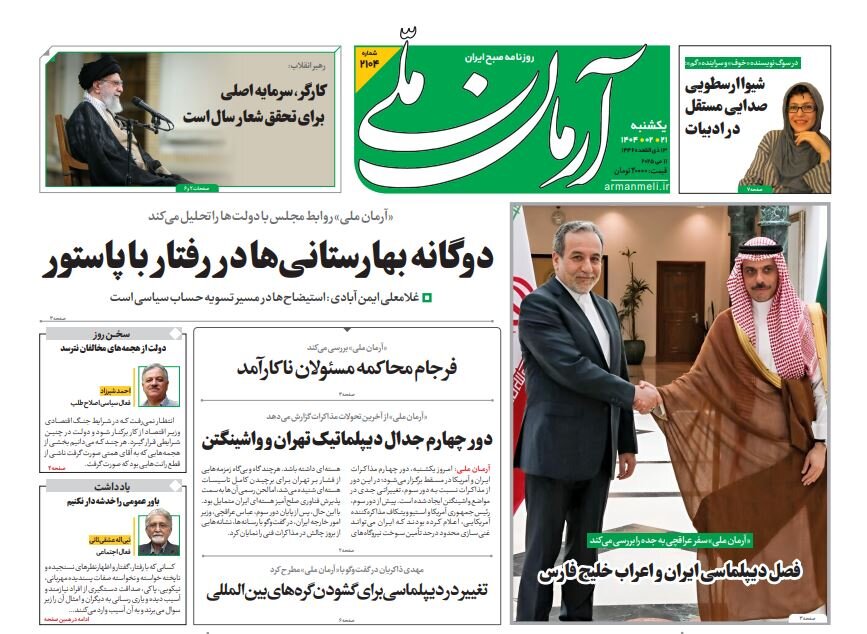In Tehran-analysis, Arman-e-Melli discussed the publication of images of Iranian sites by the spy services of the terrorist MEK group during negotiations.
According to certain foreign media, these are images of Iran’s secret nuclear facilities. All of these actions, in harmony with the Israeli Benjamin Netanyahu plot and the plot against Iran, show that Iran and the US nuclear lecture opponents are trying to take every step possible, so that Iran and Washington cannot resolve the issue through negotiations. Iran emphasizes that it supports the continued negotiations, and it also argues that Americans can resolve Iran’s nuclear issue diplomatically. The fourth round negotiations between Iran and the US begin in Oman on Sunday (May 11) and if Americans do not request the demolition of Iran’s nuclear facilities, the nuclear issue and Iranian sanctions should be considered a closure.
Jam-e-Jam: Failure of oil sanctions
In the memo, Jam et Jam discussed the failure of western oil sanctions in Iran and the 29th International Oil Exhibition in Tehran. The paper has once again established Iran as a stable technical player in the regional energy sector, while Western sanctions were still in place. This is the first time this event has been held in the current government. Not only was it a place to showcase businesses, it was also a sign that it would redefine Iran’s role in energy diplomacy and integrate its independence approach in an era of sanctions. In a situation where sanctions and external pressure were intended to undermine Iran’s oil industry, this year’s exhibition showed that the industry is not only alive and dynamic, but also paving the way for self-sufficiency and development by relying on domestic and knowledge-based capabilities. This year’s exhibition showed that Iran’s oil industry has not stopped functioning and is moving towards change and innovation as it speeds up. Domestic businesses fill the gaps caused by international restrictions by relying on local knowledge, government support, a clear vision of growth, and self-sufficiency.
Sobh-e-no: Israel is the architect of Washington’s Iranphobia deception
For decades, the Zionist regime had a major impact on the media, Congress, and the US security agencies, and was able to present Iran as the source of all the crisis in the Middle East. This process has continued since the early 1990s with repeated false narratives about Iran’s nuclear program, claims of interference with Arab countries, and threats to Israel. Israel’s goal was to characterize Iran, a key regional player, as a global threat to justify America’s unwavering support for Tel Aviv, and to prevent Iran from returning to the global economy and diplomacy. Despite positive changes, the Zionist regime is still trying to derail the negotiation process from its natural course. These actions include spreading false information, incitement of American public opinion, pressure on senators, and launching psychological activities against diplomats in Iran and Western. But the difference now is that these malicious acts are being realized even within the US government.
Iran: Tehran’s clever diplomatic package
The Iranian newspaper discussed the issue of nuclear enrichment in an interview with former Iranian diplomat Kourosh Ahmadi. According to Article 4 of the NPT, all signatories of the treaty, including Iran, have an undeniable right to develop nuclear technology for peaceful purposes. Iran has always emphasized that the nuclear program is for civilian purposes only. Western pessimistic policies against the nature of Iran’s nuclear program and lack of trust have presented Iran’s nuclear enrichment program as a potential political threat. In this context, Iranian negotiating teams must defend the country’s interests in conducting peaceful nuclear activities to defend the agreement, while on the other hand, they cannot turn a blind eye to the difficult and unchanging reality of the political arena. In other words, if Iran wants to integrate enrichment rights in sustainable agreements accepted by the international community, it should not be used as a sole tool, but as part of a sensible diplomatic package that has both political persuasiveness and the ability to build trust.

